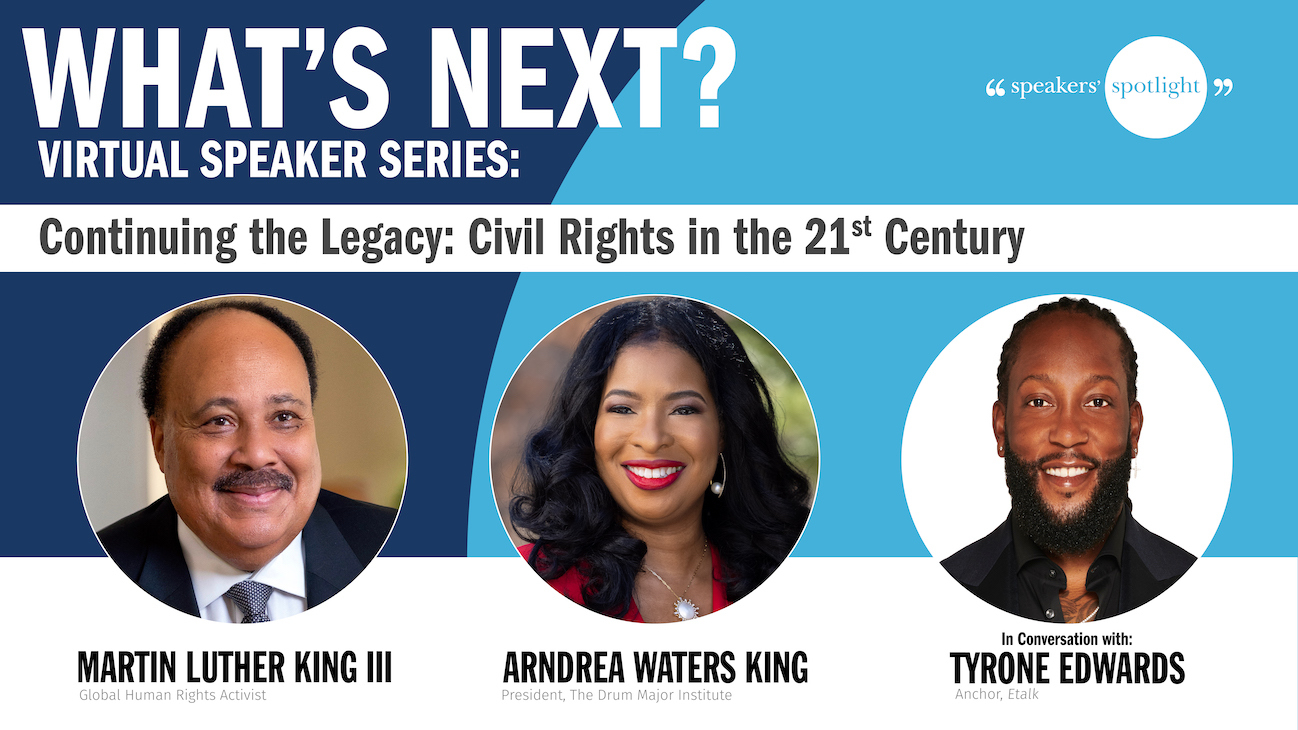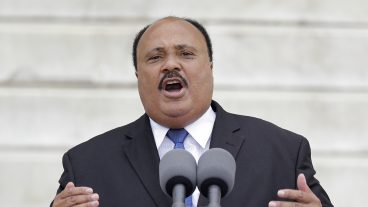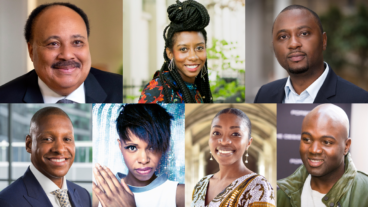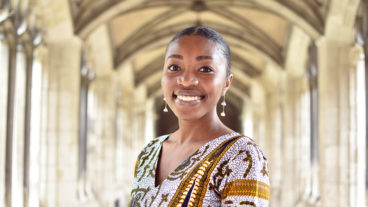“What you choose is what you help to create.” Inspiring words from Martin Luther King III as he and his wife, Arndrea Waters King, joined Etalk’s Tyrone Edwards to explore civil rights in the 21st century.
As the oldest son of the late Dr. Martin Luther King and Coretta Scott King, Martin now carries the torch of his parents’ legacy of non-violent social change. He is joined by Arndrea, who has also dedicated her life to serving humanity as a passionate leader in the global fight against inequity and injustice. Together, they lead the Drum Major Institute.
Martin, Arndrea, and Tyrone joined us for a special edition of our Virtual Speaker Series in celebration of Black History Month, exploring its importance and how we can all be allies in the quest to make equality for all not just a dream, but a reality.
Questions and answers have been condensed.
Why We Celebrate Black History Month
Tyrone: There were a few years where the excitement around Black History Month wasn’t there for me, and I’ve regained that excitement because I set new goals about what I can get out of it and what I believe I can contribute to it. At this point in your lives, what is the importance of black history month, and is it still exciting for you?
Martin: It certainly is critically important, especially as my nation is having conversations about diminishing and minimizing history through a concept called Critical Race Theory, which is being debated and voted down in state legislatures.
Traditionally, history is taught from a Western and European perspective. This excludes Indigenous population, African Americans, and people of colour. Black History Month gives us an opportunity to really talk about this history that is so profound and very much a part of the world’s history.
It is said that people who don’t remember their history are doomed to repeat the mistakes of the past. Many things that have occurred in the past do not need to be repeated, although we find ourselves repeating a lot of things. For example, we are working to protect and expand voting rights in this nation.
My father and his team in 1965 worked to enact the Voting Rights Act. The first march, called Bloody Sunday was led by John Lewis and Hosea Williams. It saw over 500 people march across the independence bridge and be beaten very badly. All of these demonstrations helped, ultimately, to get a Voting Rights Act, but, in 2013, the United States Supreme Court struck it down. So, in 2022, we are now, once again, working to get voters rights expansions and protections re-engaged. The Senate ruled against it on the day after the King holiday, January 18.
There are a lot of things we must continue to engage in and fight for. Black History Month gives us the opportunity to continue that fight by giving people the opportunity to learn what Black people have done to make this world what it is today.
Arndrea: Two years ago, we saw a great awakening, certainly in the US but frankly all around the world. I always say that things cannot be healed until they’re revealed. George Floyd’s tragic killing began this great revolution of values where we as a country, society, and world could reflect and look at what we can do to change things.
This month, if we can look at history, at the solutions, contributions, and victories, we can continue, together, to create the path forward and build a better world.
Tyrone: Building on both of your responses, there is something to be said about the value of education. We need to see good examples. A lot of our mistakes our amplified, while our contributions are erased. So, we are left to compete with this identity of what a black man is. I’m competing with that identity that society has crafted for us. So, when I get to hear the amazing things that Black people have achieved, it does give me a boost of confidence, it does make me perk up and walk taller. In those moments, I hope everyone else is listening as well because I’m so tired of competing with this identity that I don’t see at home, in my community, and that I definitely don’t see in myself.
See more from Tyrone in the video below:
Why Representation Matters
Tyrone: Why is it so important to see diverse faces in representation? To see people in your likeness in powerful places?
Martin: What I hope that society understands is that our diversity can really make us stronger because every group brings something to the table.
The George Floyd tragic Killing was highlighted significantly because every one of us was at home during a pandemic. All of us around the world, at home sheltering, saw a policeman became judge, jury, and executioner all at once. And any human being had to feel that that is unjust. The reality is that, unfortunately, this has happened in Black communities many times. It’s only recently that we’ve started seeing convictions in these circumstances.
Nothing will bring George Floyd back, but at least you can feel you have some justice. We need to create a culture and society that lifts all of its people up, that creates opportunities for all of its people. If we can do whatever we’ve done innovatively with technology then we can certainly do the same with humankind.
My dad used to say, we can swim the sea like fish, fly in the air like birds but we haven’t learned how to live together as brothers and sisters. When we’ve learned and embraced that, we can lift up everyone.
Arndrea: We have to move from living in a neighbourhood to truly living in brotherhood. Our definition of justice is that justice is simply what love looks like in the public arena. Not sentimental love, but love in its highest form. A love that seeks nothing in return, that is based on the humanity of us all. The universal love that dwells in and around each of us.
How People Can be True Allies
Tyrone: How can institutions and corporations use their privilege and platform to enact anti-racism policies without being performative?
Martin: There has to be a commitment from the top. Commitment meaning that the top layers of a company reflect society. In the United States, the corporate leadership and C-suites are getting slowly becoming reflective of the culture of their community but we still have a long way to go.
Millennials are demanding this change. We have seen diversity and human rights training expanded. For a long time, it was just language and we didn’t do anything about it, but now we are seeing blueprints being established. This is not about affirmative action, this is about maximizing profits because there is a consciousness in the air now that was not once there, particularly coming from young people.
Arndrea: On a tangible level, if you are a leader, then you have a responsibility. This work is not about collective guilt but it is about collective responsibility. This begins with self-study, and I would highly encourage leaders to find a coach, someone to help them learn more because we don’t know what we don’t know. This will allow you to lead from a point of strength based on understanding things that you may have not known before, and actually set an example from the top.
Tyrone: That momentum you mentioned before — that awareness and awakening — it did make its way around the globe. What I worry about is what happens once that momentum fades away. Do we default back to what is “normal”? Normal didn’t work for me, it didn’t work for a lot of people. Is there a way to compel or sell our leaders on the idea that this change actually benefits their bottom line?
Arndrea: There are studies that indicate that this is the case. As people become more aware, if they are really dedicated to this, they will find that it is better for their bottom line to ensure inclusivity is a core value.
Whenever there is any perceived advancement of expansion, whether real or perceived, there is inevitable backlash. This backlash though encourages us all to be more vigilant and dedicated. It’s like a slingshot — even though it may look like it’s going backwards, the tension is tightening us up and making us stronger so that when it’s released, it will propel us forward.
Martin’s mother talked a lot about how freedom is not ever really won. Each generation has to earn their freedom. Peace, justice, equity, and freedom is almost like an eternal flame. It’s up to each of us to feed those flames so it continues to burn.
See more on why diversity in the workplace matter in the video below:
Hope for the Future
Tyrone: Even with addressing some of the plight and trials of your work, there seems to still be a feeling of hope. Do you feel that sense of hope or is it me being naïve?
Arndrea: I’ll address that in two ways. I’ll go to the past and the future. As it relates to the past, I’ve been blessed to be mentored by two of Martin’s father’s colleagues — C.T. Vivian and Anne Braden. To have been mentored by two people who literally had a part in changing our world for the better, I know unequivocally what can and will happen.
For the future, our daughter and her generation are extraordinary. The way they see the world and show up in the world, and already use their voices to demand a different way of being, show that our future is in tremendous hands. For those two reason, I have great hope for our future.
Martin: There are days you are going to be discouraged, days when you are going to lose and feel very disappointed. But you have to find a way to renew your strength. You have to find a way to fortify, whether through mediation, prayer, or just reading a book. Move away from the fight momentarily. Then once you get fortified, you can come right back and re-engage.
It may not look like we are making the progress that we would like to make, but we are moving forward. It’s easy to look at things negatively because that’s what we’re programmed to do, but you have to choose. You have a choice. You can choose to look at the glass half empty or half full. What you choose is also what you help to create.
Martin Luther King III serves as an ambassador of his parents’ legacy of non-violent social change. He is currently Chairman of the Drum Major Institute.
Arndrea Waters King has dedicated her life to the global fight against inequity, helping those who have been marginalized find — and collectively use — their voices for change. She is currently President of the Drum Major Institute.
An anchor on Etalk, Tyrone Edwards is a versatile presenter and interviewer with an innate ability to ease his guests into intimate and candid conversations. He is passionate about helping people share their stories with the world.
Interested in learning more about these speakers and what they can bring to your next event as keynote speaker and/or host? Email us at [email protected]




